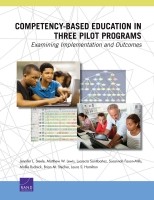| 来源类型 | Research Reports
|
| 规范类型 | 报告
|
| ISBN | 9780833087256
|
| 来源ID | RR-732-BMGF
|
| Competency-Based Education in Three Pilot Programs: Examining Implementation and Outcomes |
| Jennifer L. Steele; Matthew W. Lewis; Lucrecia Santibanez; Susannah Faxon-Mills; Mollie Rudnick; Brian M. Stecher; Laura S. Hamilton
|
| 发表日期 | 2014
|
| 出版年 | 2014
|
| 页码 | 128
|
| 语种 | 英语
|
| 结论 |
Not All Competency-Based Programs Look Alike- Each Project Mastery grantee emphasized different aspects of competency-based education. Some placed greater emphasis on student choice and project-based learning, while others focused on flexible pacing and evaluation for proficiency.
Tensions Exist in Implementing the Approach- Sites faced challenges in determining how to provide credit for out-of-school activities, including afterschool activities and travel-based learning experiences.
- Sites experienced tension in holding all students to a common definition of proficiency and evaluating students strictly based on performance, not effort.
- Sites faced challenges in providing enough computer hardware so that students could use new competency-based curricula or in identifying funds that would permit expansion of new curricula beyond the pilot initiatives.
- Sites reported that students with weak academic backgrounds may require extra support under competency-based models.
Student Experiences Were More Similar Than Expected- Because the programmatic details of the Project Mastery sites were varied, one striking finding was the similarity of students' self-reported experiences across sites.
- The highest student reports of engagement, flexible pacing, and choice came from a site in which respondents were focused on yearlong, self-directed projects that applied academic content to real-world contexts.
Student Performance Varied Across Sites- Effects of competency-based models on student learning appeared most positive in programs that put primary emphasis on student choice with project-based learning.
- However, the research design did not permit causal inference, and these findings could be at least partially due to students' or teachers' selection into the programs.
|
| 摘要 |
Lessons for Policy- Competency-based education programs should be assessed on a variety of near-term and longer-term outcomes.
- In a competency-based system, flexibly timed accountability tests may provide better measures of progress than fixed, annual tests.
Lessons for Partnerships- In collaborating with technology developers, schools should negotiate favorable terms and anticipate technical challenges.
- Collaboration between sites and funders should consider local infrastructure and capacity.
Lessons for Practice- Increased student autonomy calls for engagement through skillful teaching.
- Competency-based education systems must be vigilant about equity.
|
| 主题 | Disadvantaged Students
; Education Curriculum
; Education Reform
; Educational Program Evaluation
; Educational Technology
|
| URL | https://www.rand.org/pubs/research_reports/RR732.html
|
| 来源智库 | RAND Corporation (United States)
|
| 资源类型 | 智库出版物
|
| 条目标识符 | http://119.78.100.153/handle/2XGU8XDN/107727
|
推荐引用方式
GB/T 7714 |
Jennifer L. Steele,Matthew W. Lewis,Lucrecia Santibanez,et al. Competency-Based Education in Three Pilot Programs: Examining Implementation and Outcomes. 2014.
|
|
文件名:
|
x1495316211878.jpg
|
|
格式:
|
JPEG
|

|
文件名:
|
RAND_RR732.pdf
|
|
格式:
|
Adobe PDF
|
除非特别说明,本系统中所有内容都受版权保护,并保留所有权利。